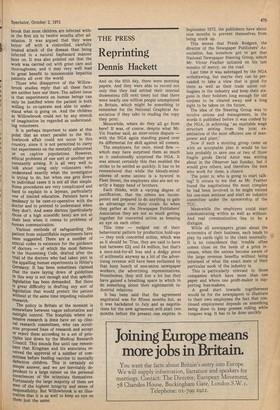Reprinting
Dennis Hackett
And on the fifth day, there were morning papers. And they were able to record not only that they had settled their internal dissensions (till next time) but that there were nearly one million people unemployed in Britain, which might be something to remember for the National Graphical Association if they take to reading the copy they print.
Meanwhile, where do they all go from here? If was, of course, despite what Mr. Vic Feather said, an inter-union dispute — with the NGA again standing guard over its differential for skill against all corners.
The employers, for once, stood firm — which may have surprised them as much as it undoubtedly surprised the NGA. It was almost certainly this that enabled the strike to be settled so quickly. It has to be remembered that while the bloody-mindedness of some unions is a byword in Fleet Street, the employers also are not exactly a happy band of brothers.
Each thinks, with a varying degree of justification, that the others are incompetent and prepared to do anything to gain an advantage over their rivals. So when they gather at the Newspaper Publishers' Association they are not so much getting together for concerted action as keeping an eye on each other.
This time — nudged out of their behavioural pattern by production hold-ups — they took concerted action, which was as it should be. True, they are said to have lost between £21 and £4 million, but that's a once-and-for-all loss and a dodgy piece of arithmetic anyway as a lot of the advertising revenue will have been reclaimed by that busy bunch of non-union newspaper workers, the advertising representatives. Nonetheless, they still lost a lot but they have gained a breathing space in which to do something about their nightmarish industrial relations.
It has been said that the agreement negotiated was for fifteen months but, as it was backdated to July and as negotiations for the new agreement will start two months before the present one expires in September 1972, the publishers have about nine months to prevent themselves from being stuck up.
This means that Frank Rodgers, the director of the Newspaper Publishers' Association, has somehow got to get that National Newspaper Steering Group, which Mr. Victor Feather initiated on his last mission of mercy, on the road.
Last time it was sabotaged by the NGA withdrawing, but maybe they can be persuaded to take a view that is good for them as well as their trade union colleagues in the industry and keep their sixguns in their holsters long enough for old corpses to be cleared away and a long sight to be taken on the future.
The idea of the Steering Group was to involve unions and management, in the words it published before it was coshed by the NGA, in achieving 'an equitable wage structure arising from the joint examination of the most efficient use of manpower and plant.' Now if such a steering group came up with an acceptable plan it would be too late probably to save one or two of those fragile goods David Astor was writing about in the Observer last Sunday, but it would give others, and therefore the men who work for them, a chance.
The point is: who is going to start talking? It occurs to me that as Mr. Feather found the negotiations the most complex he had been involved in he might extend his one-man seminar and start an industry committee under the sponsorship of the TUC. Meanwhile the employers could start communicating within as well as without. And real communication has to be a dialogue.
While all newspapers groan about the economics of their business, each tends to play its cards tight to the chest internally. It is no coincidence that trouble often comes close on the heels of a price increase, when the unions become aware of the large revenue benefits without being informed of what the exact state of their particular nook of the industry is.
This is particularly relevant to those companies which have more than one paper and where one profit-maker is supporting loss-makers. A good start towards togetherness would be for the newspapers to illustrate to their own employees the fact that continued employment depends on something being done to keep presses rolling while tongues wag. It has to be done quickly.
































 Previous page
Previous page